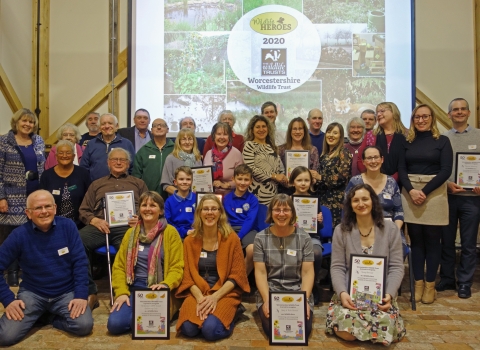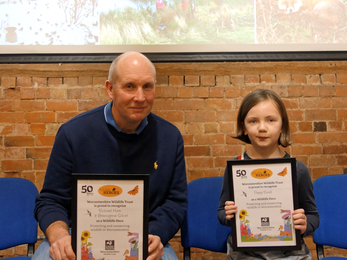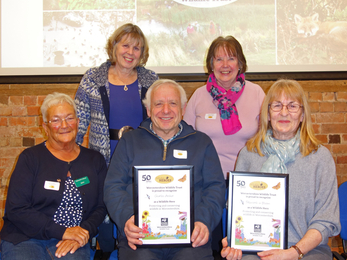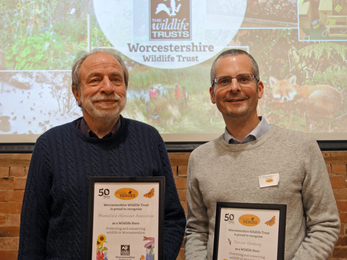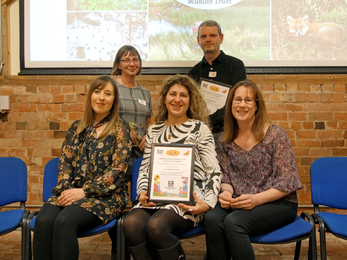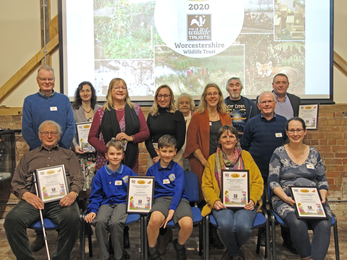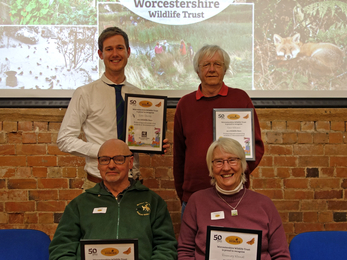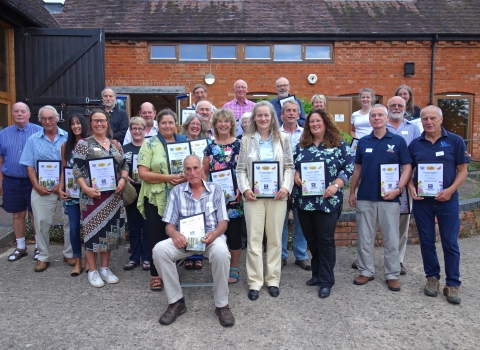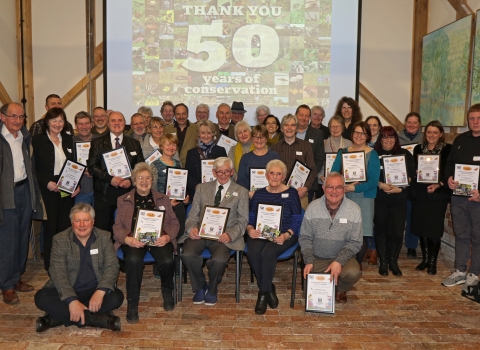We held our third Wildlife Heroes awards ceremony in January 2020 and were delighted to meet the following Wildlife Heroes...
Charles Archer
Charles is a local farmer, who maintains a beautiful meadow on his land, encouraging the natural flora and fauna to grow and flourish. In addition to this, he supports the local school in many of its environmental endeavours and allows regular use of the meadow.
Astwood Bank Primary School – Forest School
Charlotte and Amber run a very successful and innovative Forest School programme for their school, both during school and as an after-hours club. They have helped to inspire hundreds of children and given them experiences of the natural environment that they are unlikely to have had without their enthusiastic input. They find interesting ways for the children to engage with the natural world, which also contributes to their literacy, maths and science topics. The children love Forest School (throughout the year - come rain or shine) and having the opportunity to learn and play at the same time.
Susey Bamber
Susey has worked in Worcestershire as an Agricultural Advisor for over 10 years, during which time she has worked for Natural England, the Farming and Wildlife Advisory group and Severn Trent Water to deliver environmental improvements to the farmed environment. Susey does this by working with farmers to mitigate pollution, improve farm infrastructure and improve soil health. Susey has undoubtedly worked with more landowners in Worcestershire than any other Advisor and gone above and beyond to ensure she has brought about a benefit to the wider countryside and its wildlife.
Chris Bradley
Chris has made a lifelong study of the deer in the Wyre Forest, his acclaimed book "The Realm of The Fallow Buck" published in the late 1990s, remains very relevant today. Before any cull of deer is taken, Chris is asked for his views by the Forestry Commission, with the well-being of the herd his prime concern. Chris is also chairman for The Wyre Forest Society, which campaigns for nature within the forest.
Liam Crowley
Liam is a great voice for wildlife, especially invertebrates, being a keen entomologist, educator and communicator. Not only does Liam visit a number of schools to inspire them about bees and other insects, he also, along with his co-host Nick, produces and stars in a very informative free podcast called Entocast. In each show they focus on various invertebrates such as bees or beetles, talking about insect anatomy, behaviour and value to our ecosystems. This podcast, funded by the Royal Entomological Society, is well worth a listen.
In addition Liam is keen wildlife recorder, focussing on sites such as Hartlebury Common, and our very own The Devil’s Spittleful. Liam provides a strong voice for those creatures in the county that are too small to speak but have much to say.
Bromsgrove School - Richard Hare
Richard is the Head Groundsman at Bromsgrove School. In the last five years the school have planted an orchard of 50 different fruit trees (all midlands-based varieties), introduced several wildlife meadows across all the school sites, planted large numbers of trees and hedges, left manicured lawns for wildlife, introduced a bee-keeping club with a beehive on site. The school is also in the process of building a wildlife-friendly area, which includes a wildlife-friendly pond and several other ponds have also been created around the school sites.
Paul Edwards
Paul is an enthusiastic bird lover and keen advocate of wildlife. In his role as Community Officer for Fortis Housing, he has been championing green initiatives in a variety of projects and has been instrumental in bringing about the creation two new wildlife areas which focus on provision for pollinating insects in the Tolladine area.
Poppy Elwell
Poppy is aged nine but has been ecologically minded from an early age. Whilst being pushed round the park in a baby buggy she would spot discarded cans for her grandparents to pick up. She is part of her school's Eco Council and has produced her own eco posters for display around the school. Poppy has been keen to share her enthusiasm and commitment, going into other classes to talk to other pupils, encouraging them to be more eco-conscious. Last Christmas, Poppy asked Santa Clause for a 'litter picker’ and both Santa and his Elf said it was ‘a definite first’! In a continuing theme, she declined Santa’s offer of a bag of reindeer food as it contained glitter that she suspected might not be biodegradable.
Whenever she visits her grandparents’ cottage next to Worcestershire Wildlife Trust's reserve Piper’s Hill she always takes her litter picker and bin bag to go litter picking in the woods. She is an inspiration to other young people, encouraging them to take a more active role in conserving their local environment.
Gary & Nicki Farmer
Gary and Nicki have a fantastic garden for wildlife and make sure that they consider many different species in how they manage it. They are both very knowledgeable and enthusiastic about wildlife and are more than happy to share this with others, inspiring many throughout their careers and personal lives. As members of the Worcestershire Recorders they contribute greatly to the understanding of wildlife in the county.
St Georges COFE School Gardening club
Zorah, Teresa and Trevor run the gardening club at St Georges school in Worcester. This extra-curricular group offers children who need some extra support the chance to spend time outdoors, making their school a more pleasant place for children and wildlife. The school grounds are limited in terms of green space but they have made the most of the little bit they have. Last year they added several bird boxes and they have a small pond which the frogs visit, much to the delight of the children at playtime. The club has made several pollinator hotels and recently they planted 15 saplings of crab apple, Hazel and Rowan. They’ve made a herb bed for bees and grow other flowers along with fruit and veg. This year they plan to create a sensory garden that will include plants for pollinators, an area for nettles and other foodplants for caterpillars, as well as a hedgehog house and large bug hotel. They keep tidying over winter to a minimum, so that wildlife can find places to shelter through the colder months.
Becky Lashley
Rebecca is a face to everyone working locally in the conservation sector; she’s been synonymous with much of the work which the Biodiversity Partnership has delivered and has a unique track record in building partnerships for biodiversity across all sectors. Working with Worcestershire Biological Record Centre, she has delivered countless training courses, raised awareness and upskilled the public, professional ecologists and land managers on topics from black poplars and veteran trees to noble chafers and traditional orchards. Rebecca has delivered Worcestershire’s Biodiversity Action Plans and has worked with all the partners whose work contributes to the Plan’s objectives. She also drove the partnership that developed a series of projects focussed on natural and built heritage, biodiversity improvements and community involvement in the Vale of Evesham. Rebecca organised the 2016 Pollinator’s Conference, which inspired individuals and organisations across the county to pledge for pollinators and find local initiatives to benefit biodiversity. Of particular note is her long-standing commitment to the orchard projects, where she has helped make the application process as simple as possible for orchard owners, to enable as many sites as possible to benefit.
Monksfield Allotment Association
In 2015 a group of allotment owners got together to do something about a section of their site that was too shaded by trees to be any use for growing vegetables. They decided that, rather than to let it go to waste, to come together and turn it into a mini nature reserve. A pond was dug, trees and a hedge planted, a meadow sown and a bug hotel and bird-feeding station built. A hibernaculum has also been recently added for amphibians and reptiles. It has taken time to establish itself - the pond, for example, initially became choked with green algae but the water has since become clear and is a haven for damsel and dragonflies. There are masses of frog spawn in the spring and grass snakes have also been seen in it. The hedges and trees are coming along nicely and the meadow is changing from a bit of a weedy patch into something approaching a flower-rich meadow. The high spot for all concerned has been seeing hedgehogs on the patch as well as reports of hedgehogs with young on other allotment plots nearby.
Old North Stables Community Garden
Tony and the team of volunteers at the Old North Stables have worked wonders to create a community garden out of a disused space just off Pitchcroft racecourse. As part of Transition Worcester, they are helping to educate the public about sustainable food production and wildlife-friendly gardening techniques. Most resources are donated or recycled and imaginative re-purposing avoids unnecessary waste, with old bath tubs collecting rain water, plastic piping providing the structure for polytunnels and raised beds made from old water tanks. The relatively new forest garden has made a good start, an area of bramble and big trees is left wild apart from the bird feeders and nest boxes, the much decayed hard-standing where the stables once stood feature raised beds, poly tunnels and greenhouses. There is a meadow, lots of fruit and edible trees, no pesticides and a small collection of bee hives. Open most days to welcome the public, Tony speaks enthusiastically and knowledgeably to passers-by about the garden, what grows there and why, as well as encouraging them to have a go themselves. It’s a haven for local wildlife with hundreds of birds, bees, butterflies and the occasional gang of brawling foxes!
Pebworth in Bloom
As part of their bid to the Britain in Bloom Challenge Pebworth in Bloom have created many new planting projects for the benefit of pollinators, put up numerous bat, bird and insect boxes in the village, worked with the Vale Wildlife Rescue Centre to re-home and care for many hedgehogs and turned an attenuation pond on a new housing development into a wildlife haven. They work closely with the local primary school to support them in their conservation efforts including the establishment of a Forest School. Villagers have taken part in tree and wildlife surveys, created wildflower meadows, a stumpery, ponds and wetland areas and have held several events in the village to help local residents appreciate their local wildlife. They are now working with the Trust’s Natural Networks team to see what funding may be available to develop their wild spaces even further for the benefit of local wildlife.
Chris Potter
Over the last year Chris has been spending what little spare time he has building homes for wildlife! Chris uses his woodwork skills to build hedgehog boxes, bird boxes, bug boxes, bee hotels and bird tables. These creations are then donated to Worcestershire Wildlife Trust and are available for members of the public to buy. So far over £2000 has been raised from the sale of Chris's wildlife products (or Chris's Creature Comforts as they're now fondly referred to). Chris's contributions directly help wildlife in the county as well as demonstrating to the public how they can help wildlife in their own garden. The time, effort and care that Chris puts into making these products is incredible, and it’s lovely to think of the difference they are making for wildlife across the county.
Rowan Court Residents
The residents at Rowan Court are enthusiastic gardeners and have worked together to transform an area of grass at the back of their property into a wildlife garden, with wild flowers, bulbs, and mini-beast homes. They have created new habitats and increased their knowledge of local wildlife and how they can use their garden to better provide food, shelter and nesting sites.
Bill Richardson
In February 2018 Bill read an article about the dramatic decline in bird numbers over the past 50 years and decided to try and do something to help. Through his work at the charity Welcome to our Future, Bill made lots of grant applications to charitable trusts for funding to buy bird nesting boxes to help lots of different species - ranging from small birds like wrens to larger boxes for barn owls . During 2018 Bill secured grants totalling more than £23k, which has paid for hundreds of nest boxes to be distributed to a wide range of organisations including schools, churches, village halls, hospices, National Trust , Duckworth Trust, Bishops Wood Centre and many others, making a real difference to the bird population across Worcestershire.
Suckley School
Suckley School goes the extra mile to ensure that the children in their care are taught from a very early age to respect help and value the wildlife around them. They transformed the school pond and surrounding area into an interactive wildlife zone by applying for a £12,000 grant from Tesco’s Bags of Help Scheme. The zone also features a house for the wild ducks that have set up residence there, lots of mini beast homes and some newly planted trees. They became the first primary school in the county to be awarded Forest School status by the Forest School Association and have worked with Worcestershire Biological Records Centre’s Rare Species Project to help increase understanding of rare wildlife in the Suckley Hills landscape. They took part in a Bzzy Bee project with Worcester University and Worcestershire Wildlife Trust to learn about the protection of bees and their importance in the environment, then designed practical ways for the children to help. The children have set up a bird feeding group to look after and top up the many feeders. Children at the school understand the importance of cleaning up their environment and have taken the decision to stop eating snacks on the playground as this has an impact on the surrounding area and endangers local wildlife.
Duncan Westbury
Duncan is a Principal Lecturer in Ecology and Environmental Management at the University of Worcester and uses his Twitter account to raise awareness of helping wildlife as well as providing advice on how to do this effectively. Duncan’s produced a series of videos for his Twitter account showing how he is making his own garden more wildlife-friendly and constantly tweets about the plight of our wildlife and the simple steps that people can take at home to help wildlife
Dave Williams
Dave takes many magnificent photographs of the local flora and fauna around the Spennells estate in Kidderminster. These have helped local residents become more aware of the rich variety of natural resources in this area. He has awakened the interest of people in local wildlife, which also proved invaluable to the residents involved in the recent campaign to prevent fields from being used for development. He also gave permission for his photos to be used for a calendar illustrating local wildlife. Dave has established a blog and a Facebook page entitled 'The Landscape and Wildlife of Spennells' and has frequently had images shown on the BBC weather forecast on TV, under his 'Spennells Pensioner' tag.
Rosemary Winnall
Rosemary is one of the county’s top naturalists and a great inspiration to many. Her enthusiasm and encyclopaedic knowledge about Worcestershire’s natural world coupled with her obvious passion for communicating and her love for wildlife and inspiring others makes her an obvious Wildlife Hero as well as one of the most influential and important naturalists in Worcestershire. She is a driving force in the Wyre Forest Study Group who are responsible for raising the profile and documenting the importance of this wonderful place.

